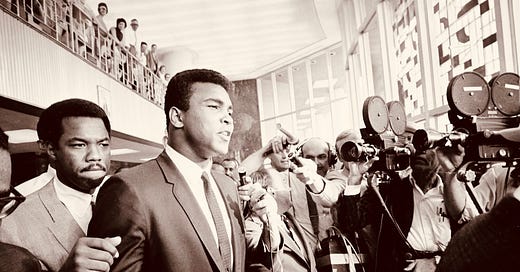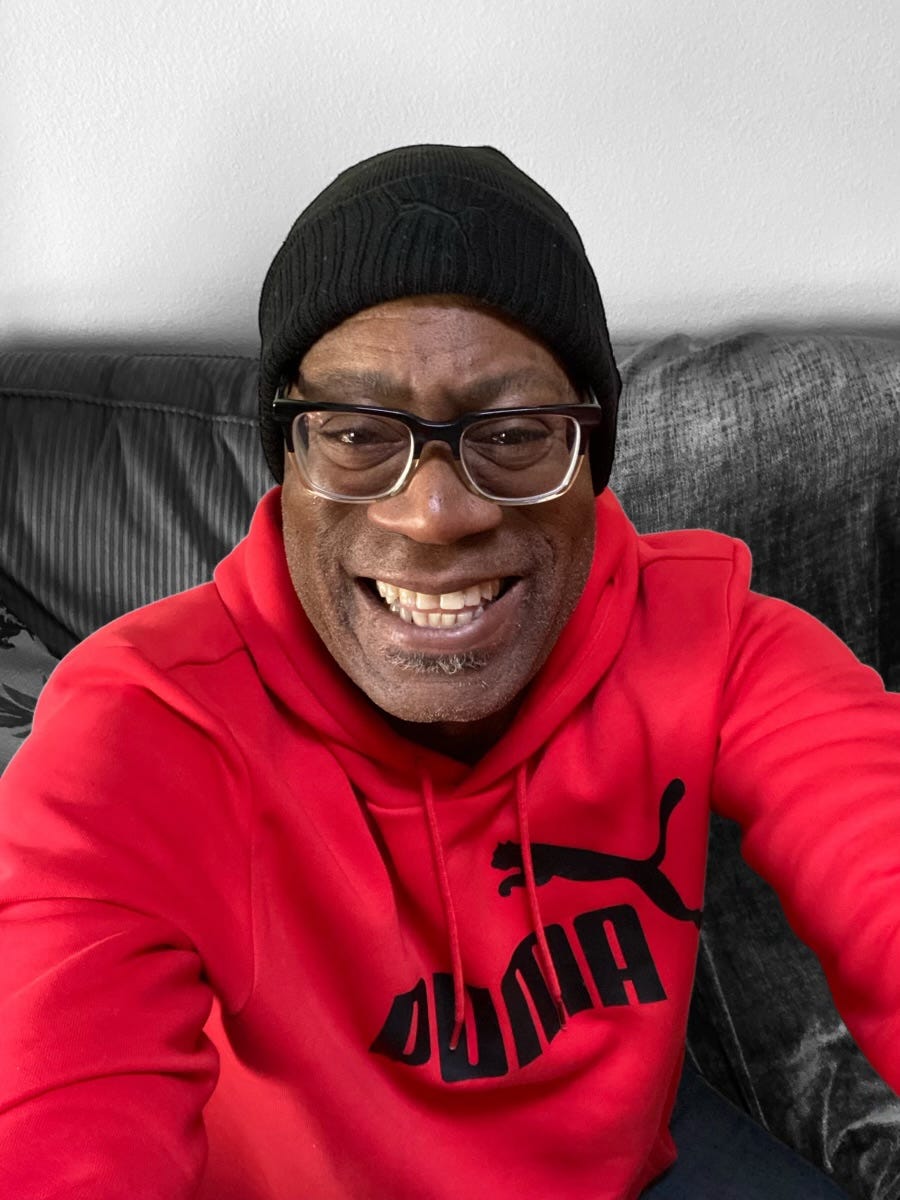During these times of political upheaval and global unrest, I often find myself wondering what Muhammad Ali would say if he were alive today.
Not the Ali on the Wheaties box, not the man reciting “Float like a butterfly, sting like a bee” for the thousandth time. No—I mean the deeply spiritual, Sufi-inspired, politically radical, and divinely imperfect Ali.
The man who defied a war machine, who called himself beautiful in a world that tried to beat him into silence, and who danced between ego and surrender with the grace of a mystic in gloves.
Today, we are living in a world where fear has become normalized and efforts at political pushback are often empty. Where the air is thick with misinformation and societal divide. Global alliances are fraying, American democracy feels brittle, and economic fault lines are trembling beneath us all. So I ask again: What would Ali say to all this chaos?
Maybe he’d smile that cocky grin and say, “I’ve seen this fight before.”
Because he had. Ali stood at the center of firestorms—racial, spiritual, political, and personal. He said no to Vietnam, no to the draft, no to being used as a symbol of a country that didn’t fully love him back. And yet, he also said yes to transformation. To humility. To healing.
In his later years, when Parkinson’s slowed his steps but deepened his presence, he spoke less with words and more with a gaze that had touched the Infinite.
Ali’s spiritual journey led him toward Sufism, a mystical branch of Islam rooted in love, humility, and union with the divine. Sufism doesn’t shout. It listens. It doesn’t conquer. It surrenders. That’s a concept I’ve been leaning into myself lately—how the greatest warriors often become mystics in the end. How true strength lies not in control, but in letting go.
Which brings me, as always, back to the Tao Te Ching. “Water is fluid, soft, and yielding,” it reminds us. “But water will wear away rock, which is rigid and cannot yield.” Ali was water. Fierce in the ring, unyielding in principle, but soft in spirit. He forgave those who condemned him. He loved his people—and all people—with a kind of radical embrace that made him both revered and reviled. He lived in contradiction without apology.
I remember the first time I saw a video of him lighting the Olympic torch in 1996. His hand trembled with Parkinson’s, but the flame stayed lit. That moment shook me. Here was a man once vilified by half a nation, now carrying its sacred fire.
He was no longer “The Greatest” in body, but something deeper—he had become a vessel. A living parable. A reminder that the path of greatness often includes public humiliation, internal rebirth, and a transcendent peace that no championship belt can bestow.
I believe Ali would look at today’s polarization and remind us that true courage lies in being fully human. That it’s okay to be afraid, confused, even angry—but not to let those emotions define our character. He might say: “Don’t count the punches. Learn how to take them. Then keep dancing.”
Taoist wisdom teaches us: “Knowing others is intelligence but knowing yourself is true wisdom. Mastering others is strength but mastering yourself is true power.” Ali didn’t just master his opponents. He mastered the mirror. In his exile years—when his boxing license was revoked and he lost millions of dollars—he turned inward. He read. He prayed. He listened. That’s where he found his power.
And I’d argue we need a bit of that now.
We need less performative outrage and more internal reckoning. We need leaders who meditate before they legislate. We need citizens who, like Ali, are willing to risk comfort for conscience.
In a world that rewards convenience and compliance, Ali’s life was one long disruption. He said “I am the greatest” not to boast, but to affirm a self-worth that a racist society tried to snatch away. And in doing so, he gave countless others permission to say, “I am, too.”
That’s what I hold onto now. That kind of affirmation. That kind of inner stance.
Because when the world feels like it’s careening toward collapse, the temptation is to get louder, to throw more punches, to panic. But Ali’s evolution—his Taoist-like softness in his later years—reminds me there’s another way.
“He who stands on tiptoe is not steady,” Lao Tzu writes. “He who reveals himself is not luminous.” The path forward isn’t about posturing. It’s about grounding. Surrendering to something larger than your ego, your ideology, your fear.
Ali did that. Through trembling hands, slurred speech, and a quiet faith that transcended political labels. He became a teacher of stillness, after a lifetime of movement. A warrior who laid down his armor and embraced the Tao—unspoken, unmoved, unshaken.
As I reflect on that, I ask myself—and maybe you can ask too….What fire are you carrying through your own trembling? What truth are you willing to stand for when it’s unpopular? What inner fight must you face before you can help a broken world heal?
Ali may be gone. But the ring is still here. The bell still tolls. And the Tao, like a seasoned cornerman, still whispers between rounds: “Yield. Flow. Be like water.”
And float, my friend. Float.
If the Daily Chocolate Taoist nomadic wisdom lights up your day, fuels your mind, or gives you a fresh perspective, I’d love your support as a paid member!
Or, if you’re feeling generous, drop a little (or a lot) of dirty chai latte love my way—every bit helps keep this Taoist journey flowing.
I’m committed to delivering high-quality, thought-provoking features straight to your inbox—no paywalls, no fluff, just raw, unfiltered wisdom on what it means to be human in today’s paradoxical, mysterious, and uncertain world.
Your support fuels my full-time mission, and I appreciate every single contribution. Let’s keep this energy going!
Diamond Michael Scott
aka The Chocolate Taoist






Profound reflection on a remarkable human being. I remember him as Cassius Clay when I was young. I lived in Atlanta in 1996 and attended the Olympics. Only later did I read more about his history. Thank you for sharing your insights.
The wisdom of others can be accessed without chocking on their errors. That is also true of ourselves. When we pass on hard-won wisdom to others we must take care that we don't choke others by force-feeding them our errors, for we all, being human, have errors side by side with our truths. To be wise in our worldview, we must realize the truth that those we jump to defend are those we hold most tentatively. God, the way, the truth, and the life, created us such that truth roots in our minds comfortably and falsehoods are always foreign matter that only seems to belong and is never comfortably held.